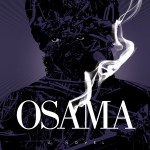Osama by Lavie Tidhar, Reviewed
Lavie Tidhar’s new novel depicts a world in which 9/11 never happen ed, and in which the date is notable only for the 1973 coup that overthrew Salvador Allende’s government in Chile.
ed, and in which the date is notable only for the 1973 coup that overthrew Salvador Allende’s government in Chile.
Joe is an expatriate PI living in Laos, where he passes much of the time drinking Laotian coffee and reading a series of cheap pulp novels titled Osama Bin Laden: Vigilante. The novels depict as fiction a series of attacks familiar to us as real events, including the attack on US Embassies in East Africa, 7/7, Shoe Bomber Richard Read, and of course, 9/11.
One day a mysterious woman turns up in Joe’s office and commissions him to find Mike Longshott, the author of the Osama series. Joe flies to Paris in search of Papa D, Longshott’s publisher, and from there to London, New York and Afghanistan.
Osama is written in an elliptical tone reminiscent of Moorcock’s Jerry Cornelius stories; Tidhar describes the minutae of coffee, cigarettes and clothes, but omits exposition, instead creating a narrative tension through the reader’s need to puzzle out the background; as Joe wonders what the World Trade Centre is, Tidhar starts to explain his alternate world, but slowly, slowly, and always by allusion. Rather like the protagonist, the reader is left with the sense that “The…writer was leaving…a trail of crumbs to follow” (p.120).
As the novel progresses, it becomes ever more Dickian, as Joe slips between realities, alongside the refugee ‘ghosts’ that he glimpses from the corner of his eye. In the novel’s clearest homage to The Man in the High Castle, Joe undergoes a reality slip that echoes Mr. Tagomi’s, visiting what appears to be ‘our’ London:
[Joe] passed a group of silent dancers: they had gathered by the corner of the street and were dancing with no sound, with no order. They all had the same white wires coming down from their ears…When he came to Shaftesbury Avenue he saw a double-decker bus but it too was wrong, with no pole and open platform at the back, the only way in was through the doors in the front and they were closed and the bus wasn’t stopping. (p.170)
Gradually Tidhar reveals that this is not simply a world where 9/11 never happened, but rather that it didn’t happen because of an earlier JonBar point. This gradual reveal will have those who prefer straightforward exposition grinding their teeth in frustration, but the novel is worth persevering with.
Lavie Tidhar has been publishing –initially in obscure venues such as Jupiter and Nenonymous- since 2003, but in the last couple of years he has started to become a regular in the major online markets and various Year’s Best SF, while his career has gained momentum with the publication of The Bookman and Camera Obscura.
Osama is an unsettling, oddly poignant look at what might have been, a world that is not necessarily better –because human nature precludes that- but simply different; it shows Tidhar’s originality and growing accomplishment in one of the best novels of the year so far.
Leave a Reply
Warning: Undefined variable $user_ID in /usr/home/wtpress/public_html/harvey/wp-content/themes/colin-harvey-theme/comments.php on line 60
You must be logged in to post a comment.
